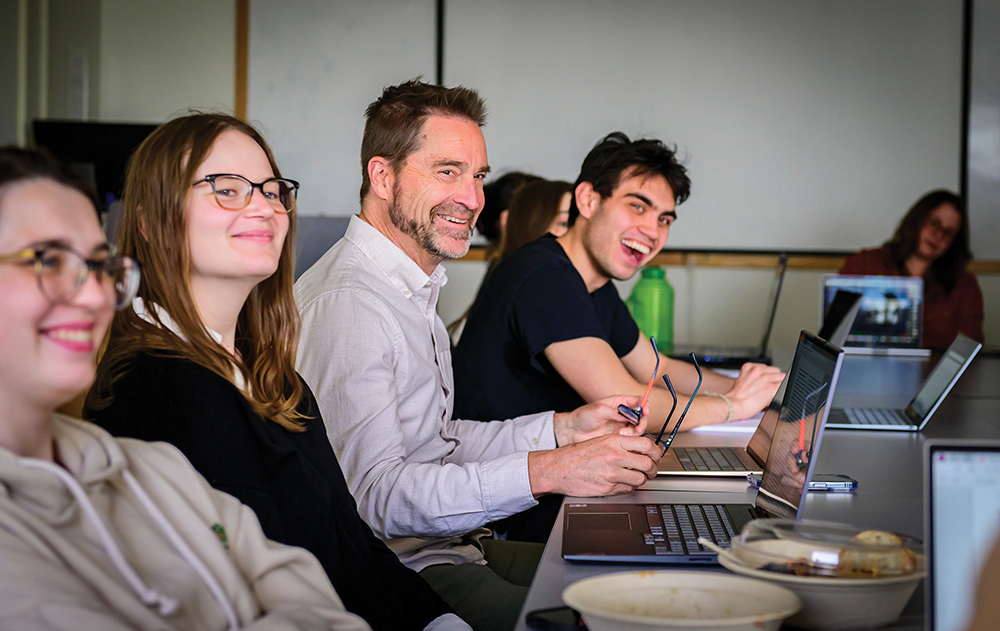Critical Thinker

“If you really want to understand a person, you have to answer four questions: First, what are you good at? That’s your smartness. Second, what’s your style [or] how do you go about [doing] things? Third, what do you want—your motives, interests and desires? And fourth, what is your story?” (Image by Fred Zwicky)
The official title of the course Psych 598 is the Personality Journal Club. But its participants know it as PIGIE: Personality Interest Group, Including Espresso. Once a week, psychology professor Brent Roberts and other faculty members lead graduate students in caffeine-fueled discussions and devil’s advocate debates about the latest research in the field of personality psychology, a field in which Roberts is considered a giant.
“Brent is a very critical thinker; he is one of the hardest skeptics in the room,” says Chris Fraley, professor of psychology and a PIGIE collaborator. “If you can move the needle on anything that he believes, that’s a huge accomplishment.”
Over the past three decades, Roberts hasn’t merely moved the needle on personality psychology with his critical thinking but repeatedly challenged the field’s conventions and conventional wisdom. His groundbreaking research on continuity and change in personality across adulthood has upended one long-held tenet after another: Personality traits can change over time. Birth order does not affect personality. Parenting style does not mold a child’s personality traits. Younger generations are not more narcissistic.
Roberts’ new rules have earned acclaim within his profession—he appeared on the Clarivate Highly Cited Researchers list in 2016, 2017, 2022 and 2023—and gained significant media attention beyond it. But he is less interested in what he considers “glam ratings” than in applying his findings to benefit individuals, especially students, raising the profile of social behavioral research and sharing the spotlight with scholars who have enabled, encouraged and advanced his pioneering work.
Personality psychology is grounded in the “big five” traits: openness to experience, conscientiousness, extraversion, agreeableness and neuroticism. Anyone who has ever taken the Meyers-Briggs Type Indicator (MBTI) or the True Colors Personality Test has assessed where they fall within those first four traits. (The tests leave out neuroticism.)
“We all live the experience of psychology; we are subject matter experts,” Roberts says. “And everyone knows what personality is, in the sense that you are different from me. When you talk about those differences, you’re going to bump into the big five.”
But for Roberts, the conversation must continue far beyond the big five. “If you really want to understand a person, you have to answer four questions: First, what are you good at? That’s your smartness. Second, what’s your style? How do you go about [doing] things? That encompasses your big five personality traits. Third, what do you want—your motives, interests and desires? And fourth, what is your story? Those are probably more important than the big five for basic things like who you marry, how many kids you have, the job you choose. It is going to dictate a tremendous amount of differences in the paths that you take.”
As for Roberts’ own story, he describes his psychology career as “a misspent adolescent protest that I doubled down on.” His father, a Marine Corps officer who was both emotionally and physically distant from his three children, separated from his mother and moved to Iran right as Roberts entered high school.
Into the void stepped Jim Hanson, an English teacher at El Camino High School in Oceanside, Calif., by title but champion of students by calling. “He cared deeply about his students and was very much of the mindset that we not only needed to find our voice but deserved opportunity and respect.” Hanson gave Roberts free rein to study what interested him and shared a steady stream of books to feed his curiosity, including several books on psychology. “The idea was, ‘What better way to irritate a Marine than to become a psychologist,’” Roberts says.
He worked in seafood restaurants to pay his way through his undergraduate studies in psychology at the nearby University of California San Diego. That work honed a personality trait—conscientiousness—that would become one of his key areas of study in later years.
After a two-year struggle to find the right graduate program to fulfill his obsession with “the life of the mind”—a period that included working construction and playing a lot of sand volleyball—Roberts discovered the Ph.D. program in personality psychology at the University of California, Berkeley. During the 1950s, the university’s Institute of Personality Assessment and Research conducted extensive research on exceptionally high achievers, from authors to architects to explorers.
“I would be doing something positive, understanding how optimal functioning worked, as opposed to dysfunction in clinical psychology,” he says. “That was very, very appealing to me. And then there was the idea of our individuality, which I thought was a given. It’s hard not to notice that we’re all different from each other; it’s one of the more salient features of human nature. Here was a program that embodied that.”
At the time, the field of personality psychology in the U.S. was just beginning to pull out of its nadir in the 1970s and 1980s, when the prevailing theory was that each child is a blank slate whose behavior is molded only by the push and pull of their social context or situation. “That bad assumption was the antithesis to the idea of personality. People are not blank slates. The internal, causal, psychological features of the personality that they carry with them have serious consequences,” Roberts says. “But that was not a popular idea. So the field of personality psychology was doing a lot of navel gazing, trying to figure out what [to] study.”
Roberts’ studies have turned heads, not just for their conclusions but for the robust data that support them. “Most of the longitudinal studies in psychology in the 20th century tended to be small, idiosyncratic studies, what I now characterize as ‘boutique research’—provocative, but not definitive,” he says.
Roberts instead was one of the first in his field to apply meta-analytic methods that sampled tens of thousands of people across hundreds of studies. His results refuted the widely held belief that personality was “set like plaster.” Further, he dispelled the idea that personality was due mostly to genetics and unchangeable. He also found that you can teach an old dog new tricks—that people’s personalities continue to change, even in middle age and old age.
“There were loud voices advocating this ‘plaster’ position, and to this day people still reiterate their points,” Roberts says. “But that’s not the case. While personality does increase in consistency with age, you’re never stuck, never done.”

“We all live the experience of psychology; we are subject matter experts,” says Brent Roberts, professor of psychology. (Image by Fred Zwicky)
He collaborated on multiple papers with Avshalom Caspi and Caspi’s wife, Terrie Moffitt, founders of the Dunedin Multidisciplinary Health & Development Study, considered one of the most comprehensive investigations of human development. Started in 1972 to guide New Zealand’s public health programs, this ongoing longitudinal study has exhaustively tracked the physical and mental health, development and well-being of around 1,000 New Zealanders.
The study has generated more than 1,200 papers by dozens of researchers, including several that distinguished Roberts as a researcher of note for his insights into the continuity and change in personality development during the transition from adolescence to adulthood. In one paper titled, “The Kids Are Alright,” adolescents studied at age 18 and then again at 26 became more controlled and more socially confident, less angry and alienated. These changes all point toward greater maturity, which has important consequences not only for the individual but also for the welfare of others.
In another paper titled, “Work Experiences and Personality Devel-opment in Young Adulthood,” Roberts found that personality traits at age 18 determined work success at age 26, but also that the work experiences themselves have the potential to modify a young adult’s basic personality disposition. “You’d assume that the work you do for a minimum of 40 hours a week has an effect on your personality, but it wasn’t a question that had been asked well or often enough,” he says.
The two papers, he says, became “citation classics—foundational papers for the whole enterprise of trying to understand personality development in adulthood.” His papers struck a chord among scholars in Europe, where the personality psychology field had remained vibrant. He received invitations to collaborate with younger German academics who were directing comprehensive, government-funded longitudinal studies that expanded on his original research.
“So often in science, ideas sit around for a long time because it’s not the right time or the right people in the right place,” he says. “I was fortunate to have my ideas hit at a time when a lot of people were receptive to them.”
When Roberts left a teaching position at the University of Tulsa to join the University of Illinois’ Psychology Department in 1999, he was thrilled to find himself with the right people in the right place. His appointment at U of I “transformed my career,” he says. “This place has literally populated the academic world with psychologists. We’re famous for having some of the best trained students in the world. So that reputation factor opens doors across campus and across the world.”
Roberts’ subsequent collaborations with colleagues from U of I and across the profession have provided a blueprint for the next generation of psychology scholars for how to apply empirical research to novel lines of inquiry. For example, he has shown that personality traits can change as a result of therapy.
He has defanged the accusation that younger generations are more narcissistic. True, young adults benefit from being narcissistic in their career development, but they become less self-centered with age. And he has examined the positive outcomes of increased conscientiousness from all angles: on career development, on academic success, on health. He even discovered compensatory health benefits of one spouse’s conscientiousness for the other, a study inspired by his wife, Teresa Cardador, PHD ’09 BUS, an associate professor in the School of Labor & Employment Relations at Illinois.
Roberts has been tapped by news outlets—ranging from the BBC to The Atlantic—to weigh in on various psychology topics, particularly his seminal 2015 paper that drew on large samples from U.S. high school students to show that birth order has no effect on personality development. “There are people who could be damaged by the misinformation that’s out there,” he says. “I feel an obligation to speak up.”
While Roberts’ work has achieved international recognition, his feet are firmly planted in Champaign-Urbana. “This place is a unicorn,” he says. “There are very few places that combine such academic excellence with such a good culture and such nice people.”
His local running club has literally been a lifesaver for him, picking him up off the ground when he fell and broke a hip, and when he collapsed during an interval workout at Memorial Stadium. Subsequent quadruple bypass surgery has forced the lifelong athlete to take things a little slower; he now plays pickleball instead of tennis.

Roberts likens the baking of sourdough bread to life. “You start with four basic ingredients, plus time, and through those things you have infinite complexity.” (Image by Fred Zwicky)
Roberts is a master sourdough baker, a skill he honed long before it became a pandemic fad. “It’s like life in some respects,” he says. “You start with four basic ingredients, plus time, and through those things you have infinite complexity.” He provisions his psychology colleagues with croissants, country loaves or whatever “carbolicious” creation he has concocted that week. “Brent has trained not only an entire generation of personality psychologists but also a new generation of bakers,” says Fraley, Roberts’ closest friend.
When Roberts was appointed the Edward William and Jane Marr Gutgsell Endowed Professorship at a ceremony in February, he credited his department colleagues for making him the scholar he is today and welcomed them to wear the medallion that came with the title. It was not an empty offer. Two days later, Fraley strode down the fourth-floor hallway of the psychology building, sporting a mischievous smile and Roberts’ blue-and-orange beribboned medal around his neck. Roberts mirrored his smile. “There isn’t an idea that comes out of my head that hasn’t been put through Chris’ coffee filter, literally and figuratively,” Roberts says.
Roberts is conscientious about not only sharing credit with his colleagues but applying his findings, resources and ideas to benefit the U of I community. “Brent is a dreamer,” Fraley says. “His talent is to plant the seeds of big ideas, nourish them, and allow them to blossom and flourish.”
Exhibit A of that talent is the Center for Social and Behavioral Science (CSBS), which took Roberts nearly a decade of committee meetings and strategic planning sessions to get off the ground. “The social sciences footprint across campus is huge,” he says. “We’re everywhere, but we were nowhere. With a center, you can bring people together to collectively do a tremendous amount of good science and good things.”
Launched in 2019, the CSBS now has 131 affiliated faculty members across all 14 schools on campus. It is drawing on that vast expertise to address three grand challenges: the digital revolution, social and behavioral health, and inequity and poverty. The center has consulted with the city of Champaign and such local organizations as DREAAM (Driven to Reach Excellence and Academic Achievement for Males) on subjects ranging from gun violence to transportation access. “Brent really took into account that we are a land grant university, and he focused on connecting the center to the community to understand its needs,” says Eva Pomerantz, professor of psychology and CSBS director.
Roberts also is eagerly pursuing ways to benefit students by incorporating his research findings into the University’s official campus app. It provides a variety of wellness and academic tools, ranging from homework calendars to bus schedules to episodes of the “Healthy Illini” podcast.
So far, Roberts has added to the Illinois app a skills self-evaluation based on the big five traits to assist students with career selection. “Those factors can help predict what’s going to happen for a student,” he says. For example, if students score low on agreeableness, they’re less likely to be considered for a leadership role. “They can decide if that is an aspect of their personality that they want to work on over time,” he says. (See sidebar)
Next, he’d like to solicit alumni to fill out the same assessment so that they can be paired with students who have similar results. “If a student thinks they want to be a computer scientist, but their assessment matches with an architect, let’s bring them together as part of the career exploration process,” he says. It’s the seed of Roberts’ next big idea, one that he will undoubtedly nourish—with enough time and caffeine—until it blossoms and flourishes.
Need a personality reboot?
Follow these five steps
How can you change your personality? The same way you would train for a marathon, Roberts says.
1. Have a concrete goal that is valuable to you.
2. Have a training partner, coach or support crew to help you along the way.
3. Make small changes almost every day. Practice, practice, practice!
4. Take a break and re- cover every once in a while.
5. Rinse and repeat.
“Plan for the long run,” Roberts says. “Change in personality will take time, months and years, not days and weeks.”

